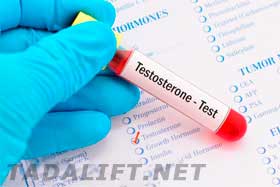Being a primary men’s hormone, testosterone performs lots of important functions within the male organism:
- It takes part in the sperm production. Both excessive and insufficient amounts of the hormone may lead to low sperm count and motility, which results in men’s infertility.
- It triggers the puberty process in boys (lowering of the voice, body hair growth, an increase in the size of male sex organs). Excess of testosterone may be the reason for early puberty in males. The effect is the opposite if the amounts of hormone are not enough.
- It regulates male desire to have sex. Male libido is under total control of testosterone. A hormone excess causes increased sexual activeness, whereas low T results in poor libido.
- It helps to get a healthy erection. A lack of testosterone leads to difficulties with getting and sustaining a healthy erection.
- It affects the bone density. Testosterone insufficiency may be the reason for bone fragility.
- It predisposes men’s hairiness. The hair growing on the male body and face is the result of testosterone work. Low T may show through the body hair loss, whereas high T makes the growth of body hair too intensive.
- It makes men behave like men. Testosterone is the hormone that gives men their confidence, competitiveness, and helps them to be aggressive when they need it. A lack of the hormone may result in mood swings, low self-esteem, and depression.
- It gives men their energy. Low T levels can make men feel tired and become less active.
What are the normal T levels and how can they be measured?
To determine the amounts of testosterone in men it is enough to pass a testosterone blood test. In the norm, the level of testosterone should be within 300-1000 nanograms per deciliter. Any indexes lower than 300ng/dL may be considered as too low. In such a case, a man may be diagnosed with hypogonadism.
On the contrary, testosterone excess (which happens quite rare) may give grounds for diagnosing hypergonadism.
In either of the cases, men need to consult with a specialist in order to get adequate treatment.

